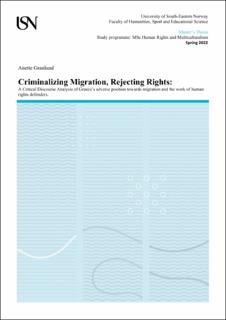| dc.description.abstract | International organisations, non-governmental organizations (NGO’s) and human rights agencies have all expressed grave concern for the increasingly restrictive migration policies and the migration discourse in Greece. Two issues of particular concern are (1) how these policies lead to the endangering of the rights of those seeking asylum and resulting in the breach of international law, in particular of the principle of non-refoulement, and (2) how these policies contribute to criminalising migrants and human rights defenders (HRD’s) (the International Organisation for Migration (IOM) 2021, Greek Council for Refugees (n.d.a.), Bathke 2020, Kallegris 2020, Council of Europe, Commissioner for Human Rights (CoECHR) 2021).
This study aims to contribute to the current debate on how the more stringent migration policies implemented by Greece’s government and the increased use of pushbacks at the Greek border are criminalising migrants and HRD’s. It will explore how the hegemonic power relations are being either reproduced or maintained in this discourse and to what extent they are challenging the human rights of migrants and HRD’s.
This study uses as it’s framework Fairclough’s method of critical discourse analysis (CDA) (Fairclough, 2015) and Wodak’s concepts of discrimination and exclusion (Wodak, 2008). A critical discourse analysis was applied to nine texts, to review the Greek government’s recent migration policies and use of pushbacks, how any potential breach of international law results in the criminalisation of migrants and HRD’s and identify any infringements on their human rights. Drawing on the concepts of hegemony, ideology and power, the study shows how the power of discourse is determining the realities of migrants as well as the HRD’s working to assist migrants.
The study shows how the Greek discourse on migration governance carries an ideological component related to the maintenance of power. By implementing restrictive policies, using deterrence measures and arbitrarily applying laws, the current migration discourse appears to emphasize ideas and policies which have the objective of keeping migrants out. This in turn severely restricts the work of HRD’s and NGO’s. | |
